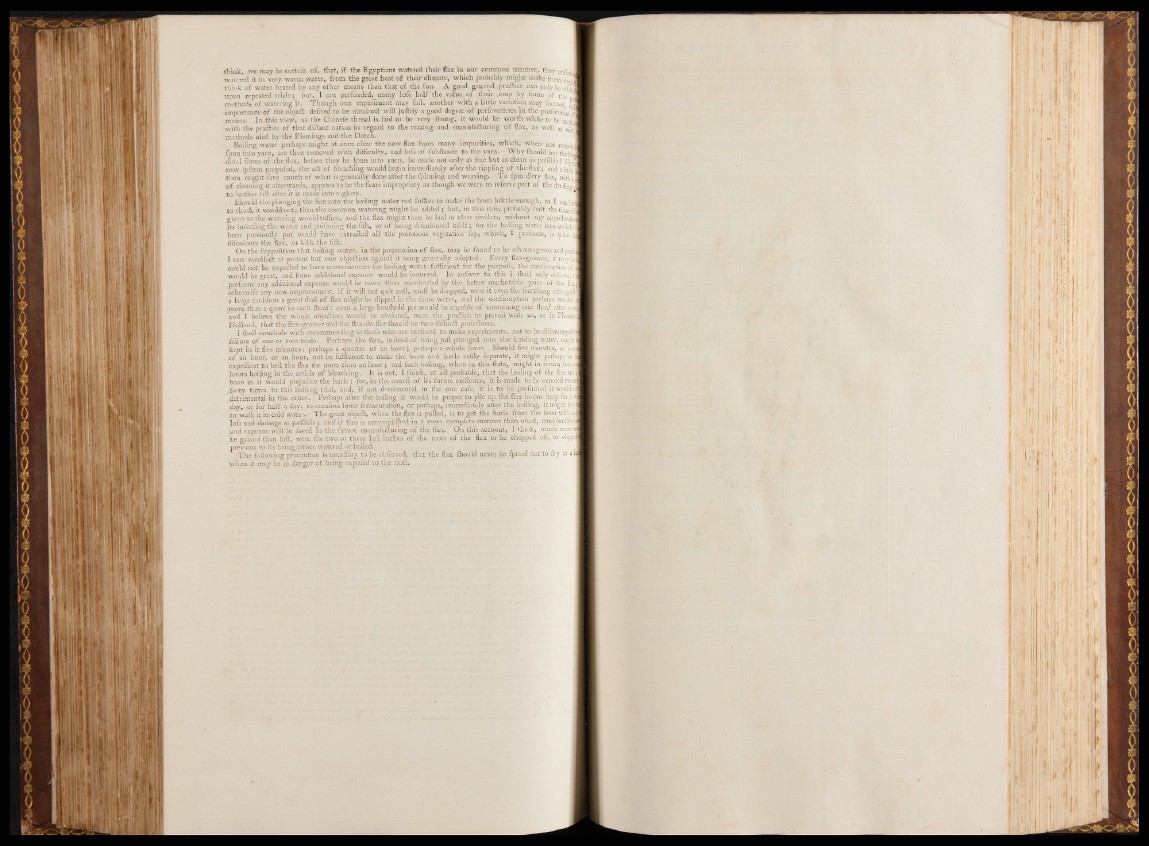
tHink, we may be certain of, that, if the Egyptians watered their flax in our common manner, they undoutJ
watered it in very warm water, from the great heat of their climate, which probably might make them neglJ
think of water heated by any other means than that of the,fun, A good general,praftice can only be efl|i
upon repeated trials; but, I am, perfuaded, many lofe half the valVie^of thejr 5crop by l'ome of the J
methods of watering it. Though one experiment may fail, another with a little variation may fucceed,
importance of the object defired to be obtained will juftify a good degree of perfeveranee in the profecutionq|
means. In this view, as the Chinefe thread is faid to be very ftrohg, it would be worth while-to he acqiiil
with the praftice.of that diftaut nation in regard to the rearing- and manufacturing of flax, as well as witJ
method's uled by the Flemings and.the Dutch.
Boiling water perhaps might at once clear the new flax from many impurities,, which, when not r e S j
fpun into yarn, are then removed with difficulty, and lofs of fubftance to the yarn. Why fhould not the Ion*
dinal fibres of the flax,' before they he fpun into yarn, be made not only as fine but as clean as poliib'fe? u J j
new fyftem propofed,. .the aft of bleaching would begin immediately after the rippling of the flax ; and a little!
then might fav.e much of what is generally done after the fpinning and weaving. To fpin dirty flax, .withal
of cleaning it afterwards, appears to be the fame impropriety as though we were tQ referve part of the dreffing j
.to leather till after it is made into a glove. ■ . ■$ •; ; ' 1
Should the plunging the flax into the boiling water not fuffice to make the boon brittle‘enough,- as I am incl
to think it would not, then the common-watering might bet .added - but, in this cafe, probably half the time ull
given to the watering would fuffice, and the flax might then be laid in clear rivulets., without any apprehenfiol
its infefting the- water and poifoning the fifh, or of being difcoloured itfelf; for the boiling water into whichjl
been previoufly put would have extrafted all the poiionous vegetative fap, which, I prefume, is what fj
difcolours the flax, or kills the fifh.
On the fuppofition that boiling water, in the preparation of flax, may be found to he advantageous and prJ
I can recolleft at prefent but one objeftion againft it being generally adopted. Every flax-grower, it may ■
could not be expefted to have conveniencies for boiling water fu ffic ie n t for the purpofe, the confumption of I
would he great, and fome additional expence would be incurred. In anfwer to this I fhall o n ly obferve, till
.prefume any ad d ition al expence would be more than reimburfed by the b e tte r marketable price of the flax I
otherwife any new improvemen t, if it will not quit c o ft, m u ft be dropped, were it even theSearching after goldi
a large cauldron a great deal of flax might be dipped in the fame water, and the confumption perhaps would n|
-iTi.o.re than a quart to each fheaf: even a large h o u fh o ld pat would be cap ab le o f .containing one fh ea f after auol
and I believe the vvhqle objeftion would be obviated, were the p ra ft joe to prevail with us,- as in Flanders)
Holland, that the flax-grower and the flax-drefler fhould be two d ifttn ft profeflions.
I Cha.ll conclude with recommending to thole who .are inclined to make,experiments, not to bedifco.uragedbj
failure o f o n e or two-trials. Perhaps the fla x , inftead of being juft plunged into the fcald in g; water, ought f*
kept in it five minutes; perhaps a quarter of an ho,ur; perhaps a whole, hour,. . Should five minutes, or a qJ
of an hour, or an hour, not be fufficient to make the boon and harle eafily feparate, it might perhaps be i
expedient to boil the flax for more than an h o u r ; and fuch boiling, when in this ftate, might in return-lave ief
hours b o ilin g in the article of bleaching. It is not, 1 think, at all probable, that the boiling of the flax \vit|
boon in it would prejudice the h a r le fo r , in the courfe of its future exiftence, it is.made to be expofed tweni
fo r ty times to this boiling trial, and, if not detrimental in the: one cafe, it is. to be; prefumed it would nfl
.detrimental in the other. Perhaps after the boiling it would be proper to pile.up the flax in one heap for a j"
day, or for half a day, to occafion fome fermentation, or perhaps,j immediately after the_boiling, it might bed
to walh it in cold water. The great objeft, when the flax js pulled, is to get the harle from the boon with a fl
lofs and damage as poffible; and if this is accompliffied in a more complete manner than ufual, cpn-fiderablelj
and expence will be laved in the future manufacturing of the flax. On this account, I.th in k , much more m
’ be gained than loft, were the two or three laft inches of the roots of the flax to. he chopped oft, or clippel
previous to its being either watered or boiled. . : . .....
The following precaution is neceflary to be obferved, that the flax , fhould neyer- be fpreadj out to dry at afj
when it may be in' danger of being expofed to the froft.